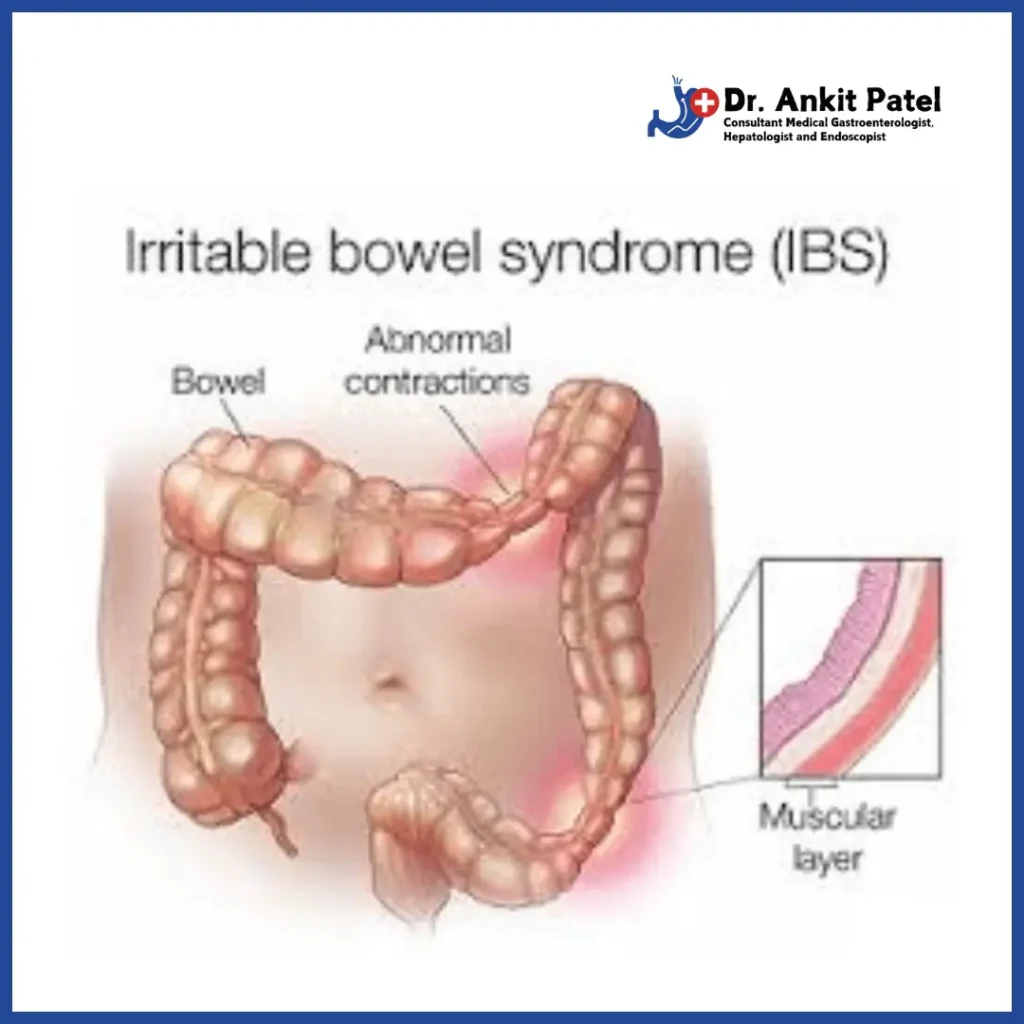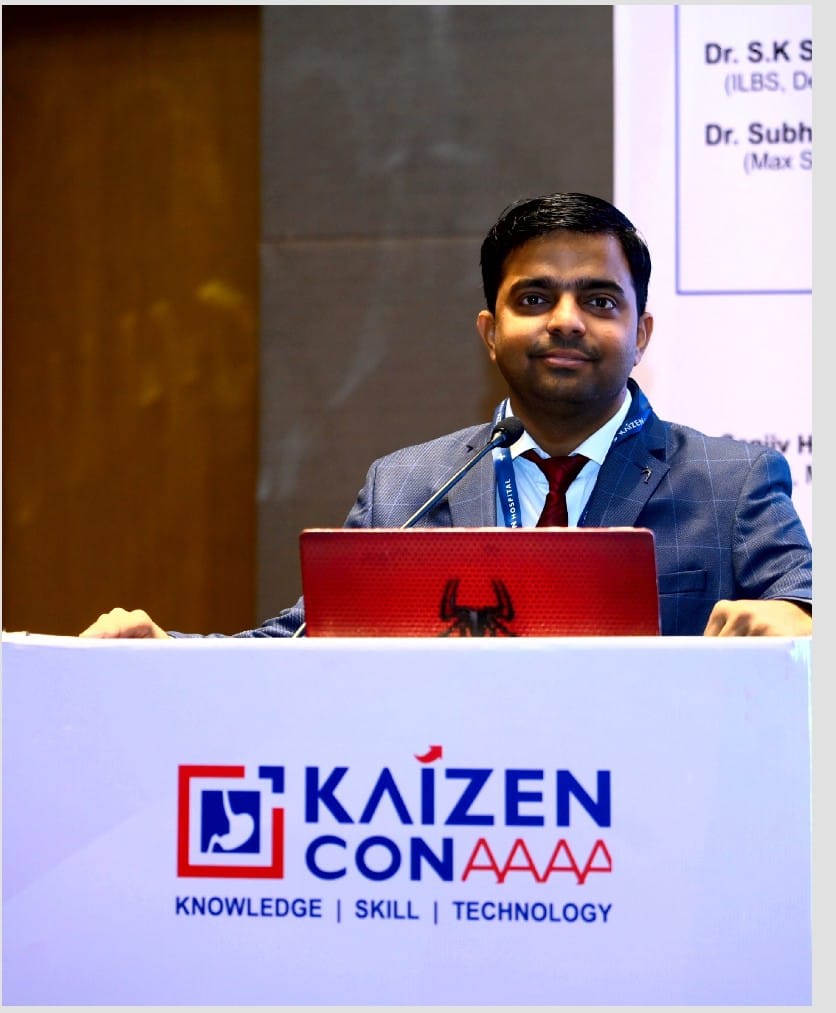IBS Treatment in Ahmedabad
Irritable Bowel Syndrome (IBS) - Causes, Symptoms, Diagnosis, Treatment, Risk Factor & Prevention

What is Irritable Bowel Syndrome (IBS) ?
Irritable Bowel Syndrome (IBS) is a common gastrointestinal disorder characterized by a group of symptoms that typically occur together, including repeated pain in the abdomen and changes in bowel movements,
Type of IBS ?
-
IBS with Constipation (IBS-C)
Predominant symptoms include hard or lumpy stools at least 25% of the time and loose or watery stools less than 25% of the time.
-
IBS with Diarrhea (IBS-D)
Predominant symptoms include loose or watery stools at least 25% of the time and hard or lumpy stools less than 25% of the time.
-
IBS with Mixed Bowel Habits (IBS-M)
Both hard and lumpy stools and loose and watery stools are experienced more than 25% of the time.
-
IBS Unclassified (IBS-U)
Patients who do not fit into the above categories but still meet the diagnostic criteria for IBS.
Symptoms of IBS
-
Abdominal pain or cramping
-
Bloating
Discomfort or pain in the chest.
-
Gas
-
Diarrhea, constipation, or alternating between the two
-
Mucus in the stool
Causes of IBS
Muscle contractions in the intestine
Stronger or prolonged contractions can cause bloating, gas, and diarrhea.
infection
IBS can develop after a severe bout of diarrhea caused by bacteria or a virus.
Nervous system
Abnormalities in the nerves of the digestive system may cause discomfort.
Inflammation in the intestines
Some people with IBS have an increased number of immune-system cells in their intestines.
Diagnosis of IBS
Rome IV Criteria
Recurrent abdominal pain on average at least 1 day per week in the last 3 months, associated with two or more of the following: Related to defecation | Associated with a change in stool frequency | Associated with a change in stool form (appearance)
IBS Treatment in Ahmedabad
Lifestyle and Dietary Changes
- Dietary fiber: Increasing fiber intake can help with constipation but may not help with all symptoms.
- Avoiding foods: Common triggers include caffeine, alcohol, chocolate, and certain gas-producing foods.
- Hydration: Drinking plenty of fluids is important, especially if diarrhea is a symptom.
Medications
- Fiber supplements: Such as psyllium (Metamucil) can help control constipation.
- Laxatives: Polyethylene glycol (MiraLAX) or lactulose for constipation.
- Anti-diarrheal medications: Loperamide (Imodium) can help control diarrhea.
- Antispasmodics: Medications like hyoscine butylbromide (Buscopan) to reduce abdominal cramping.
- Antidepressants: Low doses of tricyclic antidepressants or selective serotonin reuptake inhibitors (SSRIs) can help relieve pain.

Expert Gastroenterologist In Ahmedabad
Dr. Ankit Patel
Dr. Ankit R. Patel, Consultant Medical Gastroenterology, Hepatology and Endoscopy at Kaizen Institute of Gastroenterology & research centre, has completed his graduation & post graduation from Pramukhswami Medical College, Karamsad, Gujarat and completed DNB Gastroenterology and Hepatology training at Apollo Hospital, Chennai. He was awarded degree of Diplomate of National Board (DNB – Medical Gastroenterology) by NBE.
Best And Experienced Gastroenterologist In Ahmedabad
7000+ Medical Procedures Done
15+ Years Of Experience In Gastroenterologist & Hepatologist In Ahmedabad
Risk Factor of IBS
-
Age
IBS often occurs in people under age 50.
-
Gender
Women are more likely to develop IBS than men. Hormonal changes, especially during menstruation, can exacerbate symptoms.
-
Family History
A family history of IBS may increase the likelihood of developing the condition. This suggests a possible genetic or shared environmental component.
Prevention of IBS
- Consuming a diet rich in fiber can help regulate bowel movements. Foods such as fruits, vegetables, and whole grains are beneficial.
- Drinking plenty of fluids, especially water, helps prevent constipation.
- Eating at consistent times each day can help regulate digestion.
- Physical activity can reduce stress and help maintain regular bowel movements.
Why Choose Dr. Ankit patel
Dr. Ankit Patel has a long experience in his field and treated to so many patients. We are served since 15+ years to our patients with trust and we are happy.
100% Safe & Trusted
Dr. Ankit Patel is very safe and trusted Doctor for providing best and effective Medical treatment.
Positive Results
Gained the trust of 7000+ patients by providing them a pain free life.
Expert In Several Treatments
Dr. Ankit Patel has expert in several Gastro & Liver treatment with maximum sucess rate.
Best Consultation
Dr. Ankit Patel has a vast experience as a consultant for Gastro and Liver Disease
Book An Appointment
With Dr. Ankit patel - You Are In Trusted Hands.
Dr. Ankit Patel is the Best Gastroenterologist in Ahmedabad.
Advanced Treatments
Dr. Ankit Patel provide best and advanced treatment for various Gastro disease with maximum success rate.
15+ Years Experience
Dr. Ankit Patel is one of the renowned Gastroenterologist in Ahmedabad, who has vast experience of more than 15+ years.
Experienced Doctor
Dr. Ankit Patel has been trained from prestigious Apollo Hospital Chennai,.
7000+ Medical Procedures
Dr. Ankit Patel has done 7000+ Medical procedures in the field of IBD, IBS, GERD, Liver, Gastro, ..
Read All The Frequently Asked Questions About IBS
FAQ’S
1. Make your own meals with fresh ingredients whenever possible.
2. Keep track of your food intake and any IBS symptoms – steer clear of triggers.
3. Look for ways to unwind and de-stress.
4. Stay active with regular exercise.
5. Give probiotics a shot for a month to see if they make a difference.
There is no cure for IBS, but symptoms can be managed through dietary and lifestyle changes, stress management, and medications.
Common trigger foods include caffeine, alcohol, chocolate, fatty foods, and certain carbohydrates known as FODMAPs. It’s helpful to keep a food diary to identify specific triggers.
IBS is a chronic condition that can significantly affect quality of life, but it does not lead to more serious diseases like cancer. It requires long-term management.
Stress doesn’t cause IBS, but it can trigger or worsen symptoms. Effective stress management can help reduce the frequency and severity of symptoms.
